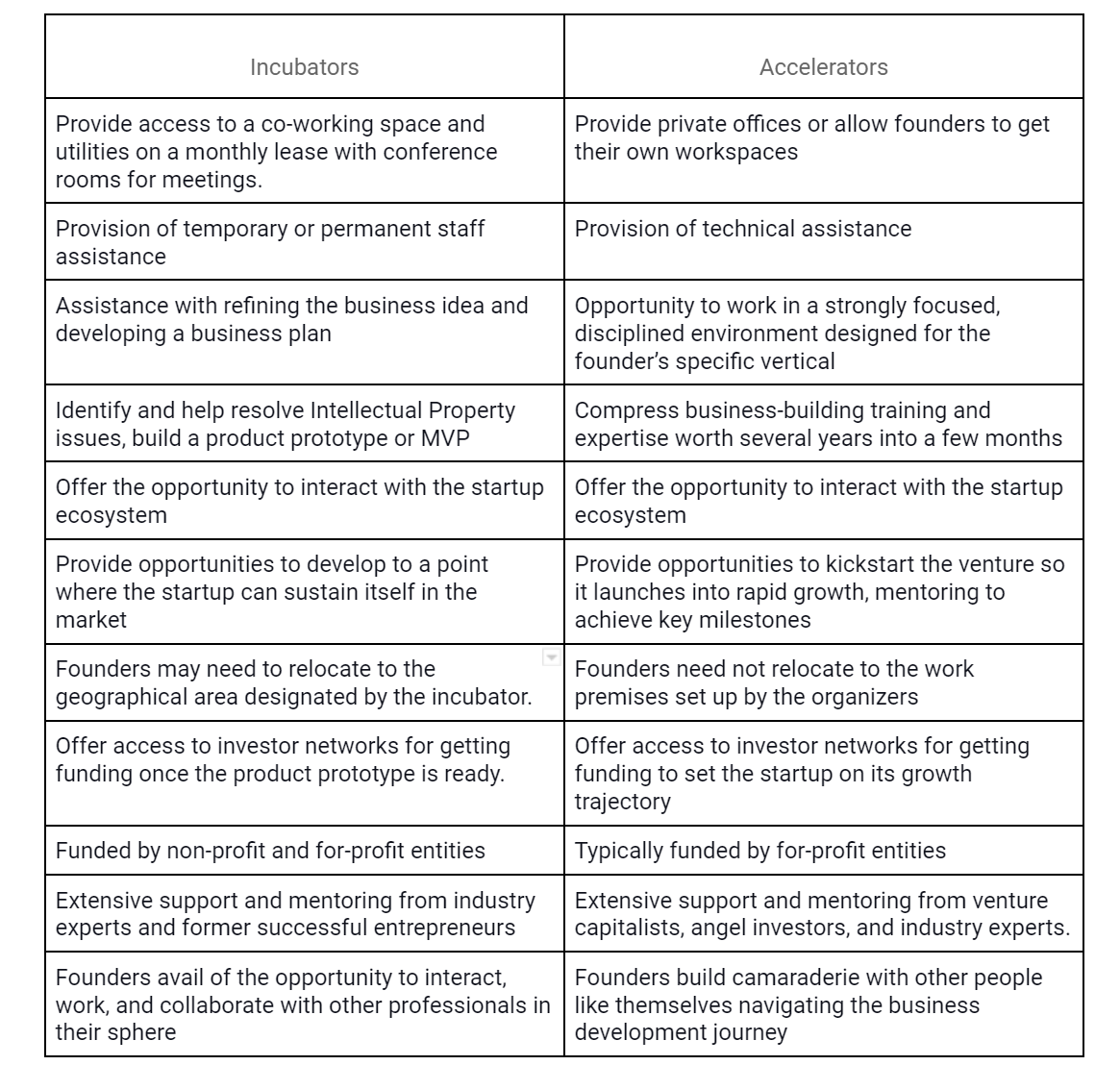Having ideated an innovative business idea, entrepreneurs need to make the choice–incubators vs. accelerators. Which is the better source of funding and assistance to build and scale a startup?
Although these terms are often used interchangeably, the two programs have some fundamental distinctions. Before signing up for a suitable option, you’ll take the time to explore how they work.
Determine the best option after understanding their processes and then work on putting together a compelling application. Getting into either program is not exactly easy since administrators have a rigorous screening process.
Just 1% to 3% of applicants successfully get accepted into incubator programs. As for accelerators, the acceptance success rate is 3.8%. Y Combinator, one of the top accelerator programs, has an acceptance rate of 2% of the applications. TechStars is another accelerator example that accepts just 10 out of every 1,000 candidates applying for a slot.

*FREE DOWNLOAD*
The Ultimate Guide To Pitch Decks
While getting into the program is challenging, once you sign up, you’ll avail yourself of several benefits. These advantages are like a launch pad that will propel the startup and contribute to its growth.
Most importantly, getting acceptance into a reputable program lends credibility to your business idea. Your chances of attracting venture capital funding at a later point increase significantly.
Choose the Appropriate Program
The key difference between incubator and accelerator programs is that incubators nurture innovative, disruptive ideas. Their objective is to transform the idea into a Minimum Viable Product and train the entrepreneur on how to monetize it.
Accelerators, on the other hand, help an existing company grow quickly. Incubators foster ideation and innovation, while accelerators scale established companies. However, they both offer founders expert mentoring, advice, knowledge transfer, and access to opportunities to acquire funding.
Early-stage ventures benefit from interactions and engagement with the startup ecosystem so they can build strategic partnerships. All of these facets raise the chances of the business attaining long-term success.
Read ahead for detailed information about incubators vs. accelerators. Understanding the differences and how they operate will help you make the appropriate decision depending on where your business is at. Learn about how they are structured, their objectives, and their purposes.

Raise Capital Smarter, Not Harder
- AI Investor Matching: Get instantly connected with the right investors
- Pitch & Financial Model Tools: Sharpen your story with battle-tested frameworks
- Proven Results: Founders are closing 3× faster using StartupFundraising.com
Understanding What are Startup Incubators
Before we get into detail about incubators vs. accelerators, let’s explore how incubators function. Startup incubators identify innovative ideas with potential and help founders transform them into working business models. Such entities can be for-profit or non-profit and operate with the objective of fostering economic development in the community.
Government institutions, academic organizations, and private entities committed to social welfare are non-profit incubators. Some of these entities have an application and interview process, while others support startups they connect with through their networks.
They typically pick the best candidates at networking events and conferences or by way of referrals from trusted partners. Angel investors or high-net-worth individuals who have themselves navigated the entrepreneurship journey may also choose to start incubator programs.
As for for-profit incubators, they include venture capitalists, major corporations, and other agencies looking to invest in promising startups. Their objective is to make profits off the equity the startup offers in exchange for their support.
That’s one of the key similarities between incubators vs. accelerators since they are also focused on making profits.
Incubator programs may choose industry-specific disruptive ideas to sponsor and support. For instance, a medical college or educational institution incubator may look for verticals in the healthcare sector.
They may welcome applications from students who have passed out from their colleges and are now innovating new business ideas. Incubator funding can also come from private grants that want to foster economic development in a specific geographical region.
Fostering the talent pipeline can bring prosperity to local communities and regions. Incubators also assist entrepreneurs with refining their business plans and navigating the challenges they might face. Transforming a great concept into an actual product that customers will want to buy is a journey with several hurdles.
Understanding What are Startup Accelerators
Moving on to the other half of the incubators vs. accelerators analysis. Business accelerators function differently from incubators in their structure and time frame. Such programs have a fixed duration that may last anywhere from a few weeks to a few months.
Entrepreneurs train under expert mentors and learn how to scale their startups quickly. They also get a small amount of seed funding and years’ worth of expertise and guidance crammed into a short time. In exchange, they require equity in the new company.
Aside from mentoring from veteran executives and industry experts, you’ll also get access to their extensive investor networks. Think venture capitalists, outside investors, angels, and other entities looking for viable business opportunities to invest in.
Accelerator programs are typically organized by well-established corporate organizations with the objective of making profits. Most initiatives are, thus, for-profit.
Early-stage startups standing between the ideation and growth stages can benefit from accelerators to kickstart their growth. At this point, they are likely ready with a product prototype or MVP (Minimum Viable Product) and some amount of pre-seed funding.
Accelerators act like catalysts to provide essential education, skills, and expertise that founders may normally take years to develop. Think of accelerators as the launching pad that compresses two years’ worth of experience into a few months.
Incubators vs. Accelerators

Incubators or Accelerators – Differentiating Factors
Program Duration
The key differentiating factor for incubators vs. accelerators is their durations. Startup founders can take their time working with incubators until they have an MVP ready for launch in the market.
Since the objective is to build a product out of a business idea, the duration can extend to two years. This is why incubator programs are open-ended. Some incubators may maintain contact with the startup even afterward to offer assistance and resources.
However, accelerator programs come with a pre-determined schedule running from three months to six months. Depending on the specific program, it can extend to a maximum of one year but not more. Their duration is close-ended, and at the end of the program, founders must present their metrics.
The objective of accelerators is to achieve growth numbers quickly and assist startups in meeting their milestones. Accelerators don’t always maintain contact with the startups, though this factor may vary according to the particular organization.
Application Process
Incubator vs. accelerator–both programs have rigorous candidate screening processes. That being said, applying for and getting into an incubator program is easier than the selection for an accelerator.
As long as you have a viable business idea with promising potential, the incubator will assist you in fleshing out the details. You’ll exit the program with a functional business plan and funding to start the company.
To get selection in an accelerator program, you must demonstrate that the startup is up and running. It should display some traction and have a Minimum Viable Product (MVP). The application process requires you to attach an operational business plan and information about the founding team, along with credentials.
Funding Assistance
Startups applying for an incubator program don’t need much funding since they are still in the process of building an MVP. The program’s focus is on creating a product that investors might be interested in backing.
Incubators invest in training applicants and preparing them for future fundraising. However, founders applying to accelerators need funding to accelerate growth in their companies. Thus, the programs focus on helping them with building credibility for the business that assists in fundraising.
Accelerators not only offer in-house funding, but they also provide access to their investor networks. You’ll interact with angel investors, venture capitalists, and other financiers who are looking for viable businesses to back.
Acquiring support from incubators and accelerators adds validation to your company and business concept. This makes it much easier for you to run fundraising campaigns successfully. Making the program’s portfolio is a prestigious move that will help your startup acquire funding.
Keep in mind that in fundraising, storytelling is everything. In this regard, for a winning pitch deck to help you here, take a look at the template created by Silicon Valley legend, Peter Thiel (see it here) that I recently covered. Thiel was the first angel investor in Facebook with a $500K check that turned into more than $1 billion in cash.
Remember to unlock the pitch deck template that is being used by founders around the world to raise millions below.
Compensation & Fee Structure
When considering your options–incubators vs. accelerators, your primary concern will likely be about compensation. Since most incubators are run by non-profit organizations, they require little or almost no equity in your startup.
However, accelerators invest much more in assisting founders in speeding up their companies’ growth. This is why, you can expect to cede some amount of equity to the program when you exit.
Even as you’re reading up on how to choose the right program for your startup, let’s get back to basics. Check out this video, where I have explained in detailed the next steps when you have a great business idea.
Entry Levels
Startups typically go through six stages in their lifetime–pre-seed stage, seed stage, early stage, growth stage, expansion phase, and exit phase.
Incubators typically assist early-stage startups that are at their pre-seed and seed levels. At this stage, founders need validation for the business idea and model. They need assistance with building the product and making critical decisions around the startup’s structure.
Since these processes can take longer, you might want to sign up for an incubator program. However, if your startup is at its growth stage, that’s when you apply for an accelerator program. At this stage, startups typically have a robust customer base and established demand for their products.
Revenues are coming in, and the Customer Acquisition Costs (CAC) are low. You’ll need assistance with recruiting and building bigger teams and structuring the business for rapid growth. That’s when accelerators enter the picture.
Need for Relocation
Incubators cater to startups who are only starting out with an innovative business idea. For this reason, they expect founders to relocate to their workspaces. Here, mentors can spend time offering advice and communicating.
Attending training sessions and workshops is more convenient, and you’ll get the opportunity to network and build strategic partnerships. Incubators typically hold seminars where entrepreneurs can mingle with investors and deliver elevator pitches. In addition to workspaces, they may provide temporary or permanent staff assistance.
On the other hand, startups applying to accelerator programs have a physical location they operate out of. They only need assistance and mentoring in scaling quickly. This is why, the program permits them to continue working on their premises. But, you can request technical assistance when needed.
Ready to Sum Up?
When making the decision to apply to incubators vs. accelerators, a simple rule of thumb is to determine the stage your startup is at. If you’re at the pre-seed stage, you should apply to a reputable incubator program. However, if you’re ready to scale the startup, your choice should be a prestigious accelerator program.
Ultimately, it’s all about ideation vs. hypergrowth. Both programs offer you the opportunity to partner with entrepreneurs from your industry. This factor opens up avenues for strategic collaborations that can prove to be profitable later on.
You’ll also get access to investor networks that might offer funding if they are suitably impressed with the business idea and its founder. The application and qualifying processes might be challenging, but if you can navigate them effectively, you’ll come out the winner.
You may find interesting as well our free library of business templates. There you will find every single template you will need when building and scaling your business completely for free. See it here.





Facebook Comments